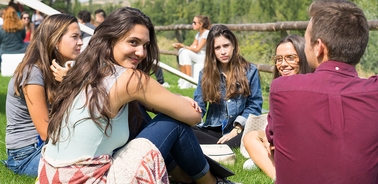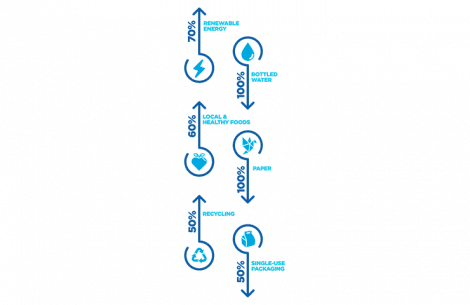- Home
- News And Events
- News
- Ie University Announces Sustainability Strategy And Will Invest €10 Million In Its ‘10 Year Challenge’ Campaign
IE University announces sustainability strategy and will invest €10 million in its ‘10 Year Challenge’ campaign

IE University’s objective is to reduce greenhouse gas emissions to zero by 2030.
IE University has announced its new sustainability strategy, including a €10 million investment in its ‘10 Year Challenge’ campaign which will focus on specific annual projects from 2020 to 2030. This year is focused on responsible consumption.
“We aim to place sustainability at the center of all aspects of the institution. This involves rethinking the curriculum, campus operations, and organizational culture,” said Isabela del Alcázar, Global Head of Sustainability at IE University. “We want to inspire people around the world to change their habits and make a positive impact on the world, and therefore this change must first begin with us: IE University staff, faculty, students, and alumni.”
Isabela del Alcázar leads the IE University Sustainability Office which works to promote environmental and social policies, teaching and research, knowledge generation, governance of sustainability policies, and awareness campaigns, and other relevant initiatives.
“At IE University, we have thought extensively about what the future will look like and what kind of education our students should receive in order to thrive in it. Our values come from a belief that we can use innovation and technology to break down boundaries, benefiting people the world over,” adds del Alcázar. �“We are committed to sustainability and have therefore adapted our education model at all levels to help people think and behave in ways that foster a more sustainable planet, global citizenship, recycling, climate change, biodiversity, renewable energy and social responsibility.”
IE University’s objective is to reduce greenhouse gas emissions to zero by 2030. To reach this objective, IE University will focus on:
- WATER. Reduce the use of plastic, single-use water bottles and promote responsible consumption. Objective: 100% reduction in the purchase of bottled water by the end of 2021.
- PAPER. Reduce paper consumption. Beginning in September 2020, all documentation will be digital. Objective: Reduction by 100% of student and staff paper consumption in the institution by the end of 2020.
- ENERGY. Reduce energy consumption on campus via lighting, air conditioning, etc. Objective: Reduced carbon footprint by becoming a zero-emission institution by 2030. During 2020, IE University will focus on increasing our purchased renewable energy to 70%.
- PLASTICS AND SINGLE-USE PACKAGING. Increase use of recycled plastic or compostable PLA (derived from corn) on campus. Objective: Implementation of ISO 14001 for correct management of waste generated by IE University community. Reduction by 50% of single-use packaging in the campus by the end of 2020.
- WASTE MANAGEMENT. Build awareness about recycling at the institution. Objective: Increase by 50% the waste we recycle during 2020.
- TRANSPORT. Implement new methods of for movement of staff, faculty, and students between campus buildings, for example car-pooling, electric shuttles, and bicycle racks. Objective: At least 50% of IE community use sustainable transport by the end of 2020.
In addition, IE University and the IE Foundation continues to work to ensure that talented students have access to the best educational opportunities and can reach their potential free of economic barriers. More than €16 million are awarded annually to undergraduate and postgraduate scholarship recipients from 100 countries. Amongst those scholarhips programs, the IE Foundation together with IE University has created the IE Resilience Scholarship Fund (COVID-19) with an initial endowment of €5 million.
In regards to teaching and research, IE University faculty currently dedicates 1,800 hours per year to training undergraduate and graduate students in areas related to sustainability. The institution plans to double this number by 2030.
IE University students participate in sustainability initiatives, such as the Social Impact Lab which supports social enterprises in South Africa and Spain through consulting projects; Financiers sin Fronteras (FsF), an NGO that promotes financial inclusion in Africa; the IE Net Impact Club, which aims to raise awareness, inspire, and equip the IE community to be socially responsible in business; the IE Alumni Sustainability Club that develops awareness regarding the United Nations SDGs; and the IE University Social Responsibility Forum which, every year, brings together top executives to discuss their CSR challenges and successes.
